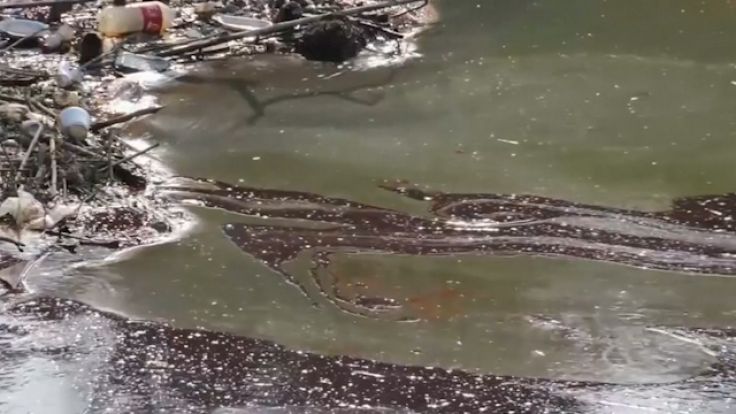Although Laura Romero has water connection in her house, water flows only for a couple of hours a day. Once a week it does not flow at all. This is not an isolated incidence, this is the situation throughout the neighbourhood.
“When there is no water, they send out water trucks. We insist they should mend the leaks in the infrastructure, but they tell us they have to draw up preliminary specifications” so as to calculate repair costs, says Romero who is a member of the ‘Front of Social Organisations in Defence of Azcapotzalco’.
The Front builds low-cost social housing complexes in middle class neighbours on preferential terms in Azcapotzalco. Last December, although it finished building houses, Mexico City’s municipality has so far refused to connect these houses to the city’s water supply, and the Front fears that the same fate awaits the remaining houses that it is likely to build. As per Romero, “The government says that each person must pay 8,000 pesos (about 350 dollars) to be connected (to the water supply).” However, an entertainment centre and 6 shopping malls in the neighbourhood have permanent water supply.
The availability of water, its monopoly, quality, overuse and pollution have put lots of pressure on water resources in Latin America.
Water resources are regarded as a national public resource and its usage is supervised by the National Water Commission. (CONAGUA). It is administered by the Municipal, States and the Central Government, which can distribute, grant and manage concessions of water bodies to agricultural sectors including industries.
In order to set right this system, in 2012, Mexico’s constitution was amended to make water a fundamental human right, however, it is not yet enforced and its benefits has yet to trickle down to citizens.
Even if citizens get water, there is still a problem regarding its usability. “Many bodies of water are polluted, and many communities have problems with water supply,” says Omar Arellano, coordinator of the Ecotoxicology group. He is also a member of the Union of Scientists Committed to Society ’s (UCCS) Social and Environmental Observatory Programme.
Arellano, who works at the Biomedical Research Institute at the National Autonomous University of Mexico (UNAM), said “in recent years a number of river diversion schemes have put local settlements at risk and altered water cycles.” These he felt are the root causes of country’s water problems. In 2012, he co-authored a report titled ‘Pollution in the Santiago river basin and public health in the region ’ which found that 280 companies dump their toxic waste into the rivers directly without treating it.
Water, Water Everywhere, but not so much for everyone
Although the National Water Resources Plan for 2014-2018 shows that the availability of natural water per capita in Mexico has fallen from 18,035 cubic meters in the 1950s to a mere, 3,982 in 2013, the availability of water is still not an issue since it is higher than the U.N prescribed guidelines which define water scarcity when its availability is between 1,700 to 1,000 metres per person.
However, more than 14 million of Mexico’s citizens have no water at home. The problem is most prominent in Guerrero, Veracruz and Mexico state. More than 34 million people depend on aquifers for their water, which are now gradually dying out.
The problem is that there is a total lack of transparency in the way water concessions are handed over to agriculture and to industries. In 2013, 82 billion cubic metres of water was provided for agricultural and industrial purposes.
“There is a lack of transparency about which companies have benefited from privatisation. There is no need to wait 20 years to see its effects,” says, Campero said. Romero also supported this point of view saying, “We want water; it is not fair that the state should deny us access to it.”
References:
http://www.ipsnews.net/2015/04/water-politics-polarised-in-mexico/
“When there is no water, they send out water trucks. We insist they should mend the leaks in the infrastructure, but they tell us they have to draw up preliminary specifications” so as to calculate repair costs, says Romero who is a member of the ‘Front of Social Organisations in Defence of Azcapotzalco’.
The Front builds low-cost social housing complexes in middle class neighbours on preferential terms in Azcapotzalco. Last December, although it finished building houses, Mexico City’s municipality has so far refused to connect these houses to the city’s water supply, and the Front fears that the same fate awaits the remaining houses that it is likely to build. As per Romero, “The government says that each person must pay 8,000 pesos (about 350 dollars) to be connected (to the water supply).” However, an entertainment centre and 6 shopping malls in the neighbourhood have permanent water supply.
The availability of water, its monopoly, quality, overuse and pollution have put lots of pressure on water resources in Latin America.
Water resources are regarded as a national public resource and its usage is supervised by the National Water Commission. (CONAGUA). It is administered by the Municipal, States and the Central Government, which can distribute, grant and manage concessions of water bodies to agricultural sectors including industries.
In order to set right this system, in 2012, Mexico’s constitution was amended to make water a fundamental human right, however, it is not yet enforced and its benefits has yet to trickle down to citizens.
Even if citizens get water, there is still a problem regarding its usability. “Many bodies of water are polluted, and many communities have problems with water supply,” says Omar Arellano, coordinator of the Ecotoxicology group. He is also a member of the Union of Scientists Committed to Society ’s (UCCS) Social and Environmental Observatory Programme.
Arellano, who works at the Biomedical Research Institute at the National Autonomous University of Mexico (UNAM), said “in recent years a number of river diversion schemes have put local settlements at risk and altered water cycles.” These he felt are the root causes of country’s water problems. In 2012, he co-authored a report titled ‘Pollution in the Santiago river basin and public health in the region ’ which found that 280 companies dump their toxic waste into the rivers directly without treating it.
Water, Water Everywhere, but not so much for everyone
Although the National Water Resources Plan for 2014-2018 shows that the availability of natural water per capita in Mexico has fallen from 18,035 cubic meters in the 1950s to a mere, 3,982 in 2013, the availability of water is still not an issue since it is higher than the U.N prescribed guidelines which define water scarcity when its availability is between 1,700 to 1,000 metres per person.
However, more than 14 million of Mexico’s citizens have no water at home. The problem is most prominent in Guerrero, Veracruz and Mexico state. More than 34 million people depend on aquifers for their water, which are now gradually dying out.
The problem is that there is a total lack of transparency in the way water concessions are handed over to agriculture and to industries. In 2013, 82 billion cubic metres of water was provided for agricultural and industrial purposes.
“There is a lack of transparency about which companies have benefited from privatisation. There is no need to wait 20 years to see its effects,” says, Campero said. Romero also supported this point of view saying, “We want water; it is not fair that the state should deny us access to it.”
References:
http://www.ipsnews.net/2015/04/water-politics-polarised-in-mexico/






